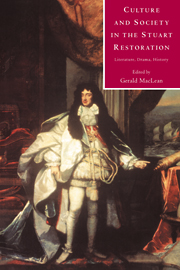Book contents
- Frontmatter
- Contents
- Notes on contributors
- Acknowledgments
- Abbreviations and note on the text
- INTRODUCTION
- PART I DRAMA AND POLITICS
- PART II AUTHORSHIP AND AUTHORITY
- PART III WOMEN AND WRITING
- PART IV EMPIRE AND AFTERMATHS
- 11 Seventeenth-century Quaker women: displacement, colonialism, and anti-slavery discourse
- 12 Republicanism, absolutism and universal monarchy: English popular sentiment during the third Dutch war
- 13 Reinterpreting the “Glorious Revolution”: Catharine Macaulay and radical response
- Index
12 - Republicanism, absolutism and universal monarchy: English popular sentiment during the third Dutch war
Published online by Cambridge University Press: 20 August 2009
- Frontmatter
- Contents
- Notes on contributors
- Acknowledgments
- Abbreviations and note on the text
- INTRODUCTION
- PART I DRAMA AND POLITICS
- PART II AUTHORSHIP AND AUTHORITY
- PART III WOMEN AND WRITING
- PART IV EMPIRE AND AFTERMATHS
- 11 Seventeenth-century Quaker women: displacement, colonialism, and anti-slavery discourse
- 12 Republicanism, absolutism and universal monarchy: English popular sentiment during the third Dutch war
- 13 Reinterpreting the “Glorious Revolution”: Catharine Macaulay and radical response
- Index
Summary
“No one is able to explain why the people of England detest the French alliance so violently or why they wish for peace with Holland at any cost,” complained the Venetian secretary in England, Girolamo Alberti, in the autumn of 1673. Especially perplexing for contemporary observers was the sudden shift in English opinion from general support of the third Anglo-Dutch war (1672–1674) to virtually unanimous condemnation.
Modern historians, while acknowledging the importance of this shift in popular opinion, have been no less uncertain of its causes. K. H. D. Haley offered an intriguing and persuasive explanation. Before the summer of 1673, Haley argued, public opinion and the House of Commons were “quite unmoved by foreign considerations.” It was at this point that William of Orange, and his propagandist par excellence, Pierre Du Moulin, intervened decisively on the English political scene. Haley carefully described, with language redolent of Cold War spy thrillers, how Du Moulin wrote and disseminated his classic pamphlet, England's Appeal from the Private Cabal at Whitehall to the Great Council of the Nation of 1673. “It was this famous pamphlet,” Haley contended, “which did more than anything else to identify the French alliance in foreign affairs with the danger of Popery at home, and consequently to lead public opinion and the Country Party in Parliament to turn against the war.” In so doing Du Moulin, and the rest of William's agents, had begun “a process which culminated in 1688–89.”
- Type
- Chapter
- Information
- Culture and Society in the Stuart RestorationLiterature, Drama, History, pp. 241 - 266Publisher: Cambridge University PressPrint publication year: 1995
- 3
- Cited by



